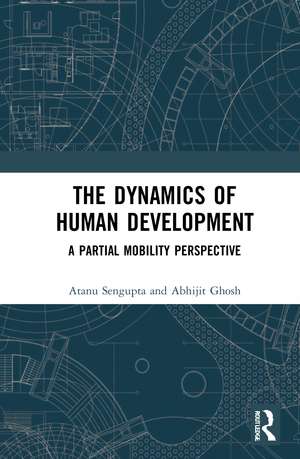The Dynamics of Human Development: A Partial Mobility Perspective
Autor Atanu Sengupta, Abhijit Ghoshen Limba Engleză Hardback – 21 dec 2020
This work breaks fresh ground in the study of human development. It will be of great interest to scholars and researchers of economics, development economics, political economy, and development practitioners.
| Toate formatele și edițiile | Preț | Express |
|---|---|---|
| Paperback (1) | 398.06 lei 43-57 zile | |
| Taylor & Francis – 25 sep 2023 | 398.06 lei 43-57 zile | |
| Hardback (1) | 987.08 lei 43-57 zile | |
| Taylor & Francis – 21 dec 2020 | 987.08 lei 43-57 zile |
Preț: 987.08 lei
Preț vechi: 1203.76 lei
-18% Nou
Puncte Express: 1481
Preț estimativ în valută:
189.04€ • 194.77$ • 158.36£
189.04€ • 194.77$ • 158.36£
Carte tipărită la comandă
Livrare economică 24 februarie-10 martie
Preluare comenzi: 021 569.72.76
Specificații
ISBN-13: 9780367429003
ISBN-10: 0367429004
Pagini: 104
Ilustrații: 1 Line drawings, black and white; 31 Tables, black and white; 1 Illustrations, black and white
Dimensiuni: 156 x 234 x 15 mm
Greutate: 0.29 kg
Ediția:1
Editura: Taylor & Francis
Colecția Routledge India
Locul publicării:Oxford, United Kingdom
ISBN-10: 0367429004
Pagini: 104
Ilustrații: 1 Line drawings, black and white; 31 Tables, black and white; 1 Illustrations, black and white
Dimensiuni: 156 x 234 x 15 mm
Greutate: 0.29 kg
Ediția:1
Editura: Taylor & Francis
Colecția Routledge India
Locul publicării:Oxford, United Kingdom
Public țintă
PostgraduateCuprins
1. Dynamics of human development: the perspectives of partiality 2. Partial mobility: relative changes in human development 3. Jump in the dynamics of human development 4. Fractional mobility in human development 5. Some general issues in the partial mobility of human development 6. Conclusion
Notă biografică
Atanu Sengupta is Professor at the Department of Economics, Burdwan University, West Bengal, India, where he has been teaching for more than a decade. He has published over 45 papers in various refereed national and international journals such as Economic and Political Weekly, Sankhya, Social Indicators Research, International Journal of Education and Development, Indian Economic Review, Asia Pacific Development Journal, and Asia Pacific Journal of Education and Development, and has also contributed chapters in various edited volumes. He has published eight books, including two edited volumes, and is a regular reviewer for several journals. His areas of interest include econometrics, financial economics, development economics, microeconomics, and growth theory.
Abhijit Ghosh is Assistant Professor of Economics, Mahatma Gandhi College, Lalpur, West Bengal, India. He was formerly with A N Sinha Institute of Social Studies, Patna, Bihar, India. He has widely participated in international and national seminars and conferences. He is a regular reviewer for several journals. His research has been published in various national and international journals such as Economic and Political Weekly, Social Indicators Research, Asia Pacific Development Journal, Journal of Health Management, and so forth. He has also contributed papers in edited volumes and is the author of one book. His areas of research interest include human development and related issues (education, health, and food security), regional economics, local government and panchayati raj institutions, and applied econometrics.
Abhijit Ghosh is Assistant Professor of Economics, Mahatma Gandhi College, Lalpur, West Bengal, India. He was formerly with A N Sinha Institute of Social Studies, Patna, Bihar, India. He has widely participated in international and national seminars and conferences. He is a regular reviewer for several journals. His research has been published in various national and international journals such as Economic and Political Weekly, Social Indicators Research, Asia Pacific Development Journal, Journal of Health Management, and so forth. He has also contributed papers in edited volumes and is the author of one book. His areas of research interest include human development and related issues (education, health, and food security), regional economics, local government and panchayati raj institutions, and applied econometrics.
Descriere
This book studies the dynamic aspects of the Human Development Index (HDI) through a partial mobility perspective. It offers a new axiomatic structure and a set of mobility indices to discuss partial trends and interrogate the human development status at the sub-group and sub-regional levels.
